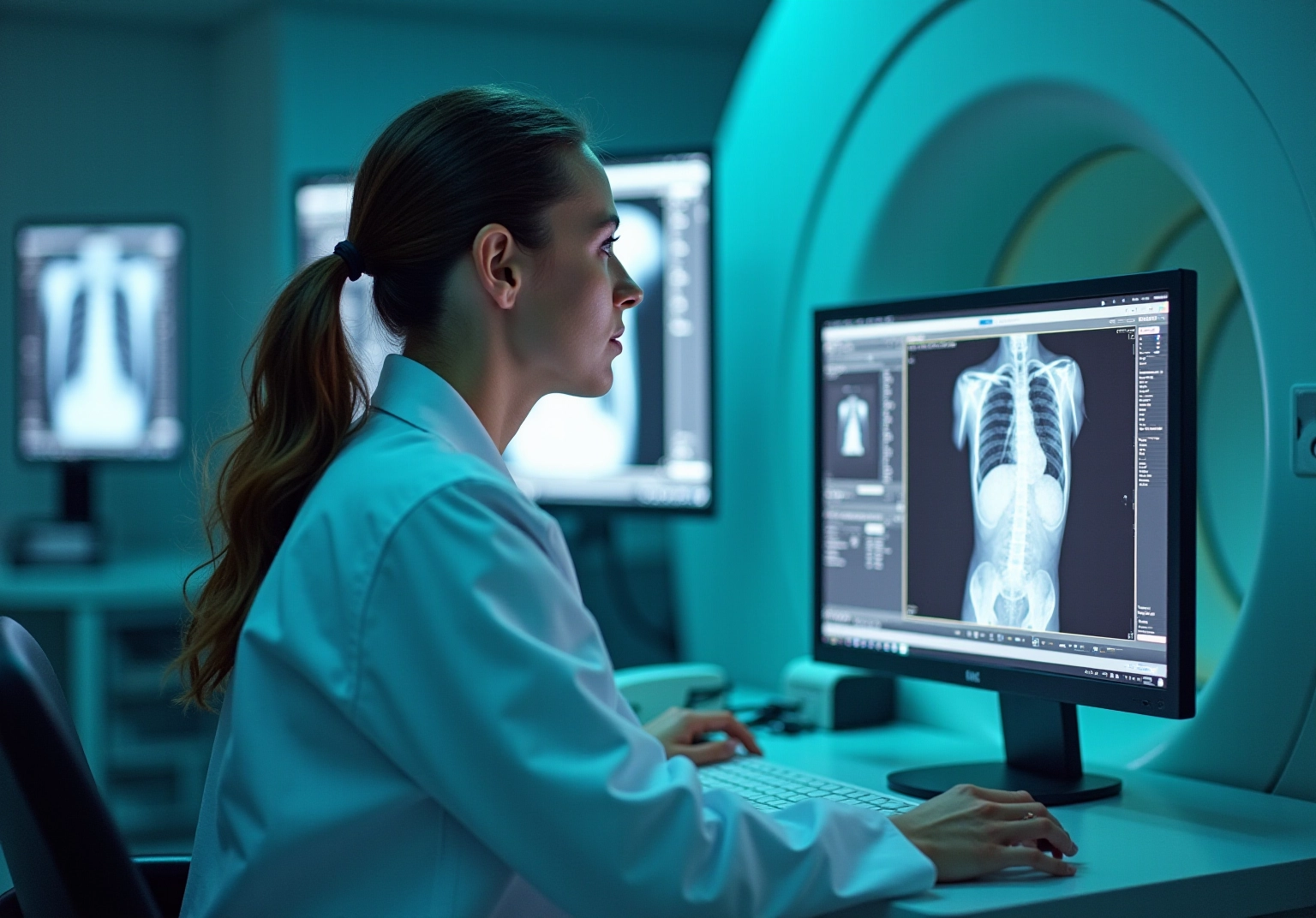
The article examines the transformative applications of AI in healthcare, spotlighting ten pivotal innovations that redefine patient care. Innovations such as IBM Watson Health and Aidoc leverage sophisticated algorithms to enhance diagnostic accuracy, optimize workflows, and elevate patient outcomes. This is substantiated by notable improvements in detection rates and operational efficiencies, underscoring the significant impact of these technologies on the healthcare landscape.
The integration of artificial intelligence in healthcare is not merely a trend; it represents a transformative force reshaping patient care and clinical outcomes. By enhancing diagnostic accuracy and streamlining administrative processes, AI applications are revolutionizing the operations of healthcare providers and their interactions with patients.
This article explores ten pivotal AI innovations that are making significant strides within the industry, illustrating how they enhance efficiency, accuracy, and patient engagement.
However, as these technologies continue to advance, critical questions emerge:
The Inferscience HCC Assistant harnesses advanced AI algorithms to automate the coding process for Hierarchical Condition Categories (HCC). By analyzing clinical data in real-time, it offers precise coding suggestions that significantly enhance accuracy and compliance. This innovative tool alleviates the administrative burden on medical providers, ensuring that all relevant diagnoses are effectively captured. Consequently, it plays a pivotal role in improving Risk Adjustment Factor (RAF) scores, which can lead to substantial funding increases from Medicare Advantage patients.
The seamless integration of the HCC Assistant within electronic health records (EHRs) streamlines workflows, making it an indispensable asset for medical organizations striving to optimize their coding processes and financial performance. Real-world applications have shown that organizations employing the HCC Assistant have experienced improvements in coding accuracy by up to 70%, as reported by Innovaccer, resulting in millions in additional revenue capture. Moreover, capturing one new HCC for a member can increase the plan’s payment for that member by $3,000 annually.
Customer testimonials consistently praise the tool for its user-friendliness and effectiveness in simplifying the coding process, ultimately enhancing overall satisfaction among medical personnel. As Dr. Anil Jain emphasized, ‘Ensure that AI in healthcare applications can adapt quickly to regulatory changes and organizational needs,’ underscoring the critical role of AI in the ever-evolving landscape of healthcare.

IBM Watson Health harnesses the power of AI to sift through extensive medical data, delivering actionable insights that significantly enhance clinical decision-making. By utilizing advanced natural language processing and machine learning techniques, Watson identifies critical patterns and suggests personalized treatment options tailored to each individual’s unique needs. This innovative approach has been shown to improve diagnostic accuracy, with studies indicating that AI applications can enhance the precision of medical assessments by up to 20%. Moreover, Watson’s capabilities empower medical practitioners to make prompt and knowledgeable choices, ultimately resulting in improved outcomes for individuals. As healthcare experts increasingly depend on AI in healthcare applications, the integration of IBM Watson Health exemplifies how this technology can revolutionize care and enhance clinical workflows.
Google Health is at the forefront of leveraging AI to enhance diagnostic precision. Their advanced AI algorithms meticulously analyze medical images and individual patient data, enabling the detection of diseases at earlier stages than traditional methods.
For example, AI models have shown remarkable efficacy in diagnosing conditions like skin cancer and diabetic retinopathy, achieving diagnostic accuracy rates reaching up to 93%. Furthermore, the integration of AI-enhanced imaging analysis has led to a 28% increase in early disease detection.
By embedding these AI tools into clinical workflows, healthcare providers can deliver more accurate diagnoses, facilitating timely interventions and improved outcomes for patients. Experts have observed that AI-assisted diagnoses enable individuals to commence treatments an impressive 8.3 months earlier compared to those identified through conventional methods.
This highlights the transformative potential of AI in healthcare applications, prompting CFOs to reflect on its strategic implications.
Aidoc’s AI-powered solutions are transforming radiology by facilitating the swift detection of critical conditions, including intracranial hemorrhages and pulmonary embolisms. By leveraging real-time assessments of medical images, Aidoc’s algorithms prioritize urgent cases, allowing radiologists to concentrate on the most critical patients first. This proactive approach not only enhances workflow efficiency but also significantly improves outcomes for patients, ensuring timely diagnosis and treatment of life-threatening conditions.
Furthermore, AI alerts inform physicians about suspected emergent cases before images are processed by the PACS or reviewed by a radiologist, emphasizing its essential role in emergency care. The incorporation of AI in radiology has demonstrated a reduction in turnaround times for critical cases by as much as 30%, underscoring its influence on patient management.
As Viacheslav Petrenko notes, ‘AI can decrease diagnostic mistakes by as much as 85%, optimize administrative duties to conserve 20% of a provider’s time, and tailor treatments to enhance results by 30% to 40%.’ This illustrates the broader implications of AI in healthcare applications, with projections indicating that key AI in healthcare applications could generate $150 billion in annual savings for the U.S. medical economy by 2026.
Zebra Medical Vision addresses a critical challenge in healthcare: enhancing diagnostic accuracy for radiologists. By leveraging advanced AI algorithms in healthcare applications to analyze medical imaging data, the company delivers automated insights that significantly improve diagnostic precision. Their innovative technology excels in detecting a wide range of medical conditions from X-rays and CT scans, drastically reducing the time required for image analysis. By flagging potential issues for further review, Zebra’s solutions empower healthcare providers to make quicker, more informed decisions. This not only streamlines workflows but also enhances healthcare and operational efficiency.
Studies indicate that the use of AI in healthcare applications can achieve accuracy levels exceeding 95% for various conditions, including a remarkable 0.98 accuracy rate in colon cancer detection. However, it is crucial to emphasize that human oversight remains essential in diagnostics to mitigate the risk of oversight. Furthermore, AI integration can reduce radiologists’ workloads by up to 53%, allowing them to focus on critical cases. Despite these advancements, challenges such as the need for extensive data and technical expertise persist in implementing AI in medical imaging.
As AI in healthcare applications continues to advance, its incorporation into radiology is anticipated to further enhance diagnostic accuracy, ultimately reshaping the field of healthcare.

Tempus harnesses the power of AI to analyze both clinical and molecular data, empowering healthcare providers to formulate tailored treatment strategies for cancer patients. By seamlessly integrating genomic information with clinical outcomes, Tempus’s platform equips oncologists to pinpoint the most effective therapies customized to individual profiles. This groundbreaking approach not only boosts treatment efficacy—evidenced by AI-driven radiomics achieving an impressive 89% accuracy in predicting immunotherapy responses—but also adheres to regulatory standards for personalized medicine, guaranteeing that patients receive optimal care.
As industry experts assert, ‘AI in healthcare applications, particularly AI-driven decision support tools, will optimize treatment strategies and clinical trial enrollment, leading to better outcomes,’ underscoring the growing consensus on AI’s pivotal role in advancing personalized cancer management.
For CFOs, investing in AI technologies like Tempus’s platform can significantly elevate care quality and operational efficiency.

Babylon Health addresses a critical challenge in healthcare access by utilizing AI to significantly enhance user engagement through its innovative virtual medical solutions. The platform features AI-powered symptom checkers and virtual consultations, enabling individuals to receive prompt medical guidance without the necessity of in-person visits. This model not only broadens access to healthcare services but also empowers individuals to take an active role in managing their health.
By optimizing communication and delivering immediate assistance, Babylon Health’s AI tools have shown marked improvements in outcomes and user satisfaction. Notably, 62% of individuals reported enhanced support due to these AI tools, underscoring their effectiveness in fostering a more engaged experience. Furthermore, an impressive 89% of users expressed intent to continue utilizing virtual care after their initial interaction, indicating sustained involvement and satisfaction with the AI offerings.
The integration of AI in medical services has led to a substantial increase in client interactions, with many users expressing gratitude for the convenience and accessibility of virtual consultations. However, challenges such as trust, transparency, and risk concerns persist as significant barriers to the widespread adoption of AI.
In summary, Babylon Health exemplifies how AI can revolutionize client engagement, rendering healthcare more responsive and centered on individual needs.

CureMetrix utilizes AI in healthcare applications to significantly enhance the precision of mammography readings, thereby facilitating better early detection of breast cancer. Their sophisticated algorithms meticulously analyze mammograms to uncover potential abnormalities that may elude human radiologists. By delivering critical insights and prioritizing suspicious cases, CureMetrix’s solutions empower radiologists to make more informed decisions, ultimately resulting in earlier interventions and improved patient outcomes.
In the context of the PRAIM study, which evaluated AI-supported double reading against standard methods, AI-supported mammogram readings achieved a remarkable 17.6% higher detection rate compared to traditional approaches. Furthermore, the positive predictive value of recall was 17.9% in the AI group versus 14.9% in the control group, underscoring the effectiveness of AI in enhancing diagnostic precision. Radiologists have recognized AI as a valuable second set of eyes, augmenting diagnostic accuracy without increasing false positives, which remained consistent at 1.5% for both groups.
However, it is essential to acknowledge the limitations of the study, including potential bias stemming from the experience of radiologists and the necessity for further research prior to routine implementation. As Kristina Lång, an associate professor of radiology diagnostics, aptly noted, ‘We still need to understand the implications on patients’ outcomes, especially whether combining radiologists’ expertise with AI can help detect interval cancers that are often missed by traditional screening.’ This insight reinforces the transformative role of AI in healthcare applications, especially in the detection and treatment of breast cancer.
PathAI addresses a critical challenge in the field of pathology diagnostics: the need for enhanced accuracy and efficiency. Leveraging cutting-edge AI in healthcare applications, PathAI’s platform empowers pathologists to meticulously analyze tissue samples, identify anomalies, and standardize diagnoses. This innovative solution significantly minimizes variability in diagnostic interpretations, thereby elevating the reliability of pathology results. Ultimately, PathAI’s advancements lead to improved patient care and ensure compliance with stringent regulatory standards.

Health Catalyst harnesses the power of AI analytics to integrate clinical, financial, and operational data, empowering healthcare organizations to pinpoint high-impact areas for improvement. By leveraging predictive analytics, Health Catalyst enables providers to optimize workflows, significantly lower costs, and enhance patient outcomes. This data-driven methodology not only boosts operational efficiency but also aids in maintaining compliance with medical regulations, ensuring that organizations deliver high-quality care.
Projections indicate that AI in healthcare applications, especially through robotic process automation (RPA) in revenue cycle management, could slash medical expenses by $13 billion by 2025, with nearly 20% of providers reporting improved efficiency in submitting insurance claims. Furthermore, almost 98% of medical leaders anticipate utilizing AI in healthcare applications for revenue cycle management, underscoring the growing reliance on AI analytics to refine medical operations.
Real-world applications illustrate that AI in healthcare applications, like the HCC Assistant, can expedite patient payments and enhance accuracy in clinical documentation, ultimately revolutionizing the patient care landscape. As healthcare organizations evaluate these advancements, it will be crucial to explore specific AI tools and strategies for implementation to maximize operational benefits.
The integration of artificial intelligence in healthcare transcends mere trend status; it stands as a transformative force reshaping patient care and operational efficiency. Each application discussed—from the Inferscience HCC Assistant streamlining coding processes to IBM Watson Health enhancing clinical decision-making—demonstrates AI’s potential to improve accuracy, efficiency, and patient outcomes. These innovations signify a pivotal shift in how healthcare providers approach diagnostics, treatment planning, and patient engagement.
Key insights underscore the substantial benefits of AI, which include:
Tools like Google Health’s imaging analysis and Aidoc’s critical condition detection illustrate how AI can facilitate earlier diagnoses and prioritize urgent care. Meanwhile, platforms such as Babylon Health empower patients to engage more actively in their health management. The statistics are compelling; many AI applications achieve accuracy rates exceeding 90%, significantly reducing the administrative burdens on healthcare providers.
As the healthcare landscape continues to evolve, embracing AI technologies becomes crucial for organizations aiming to enhance care quality and operational effectiveness. Stakeholders are urged to explore the vast potential of AI applications, not only to remain competitive but also to fundamentally improve patient experiences and health outcomes. The future of healthcare is undoubtedly intertwined with advancements in AI, making it essential for providers to stay informed and adaptive to these innovations.